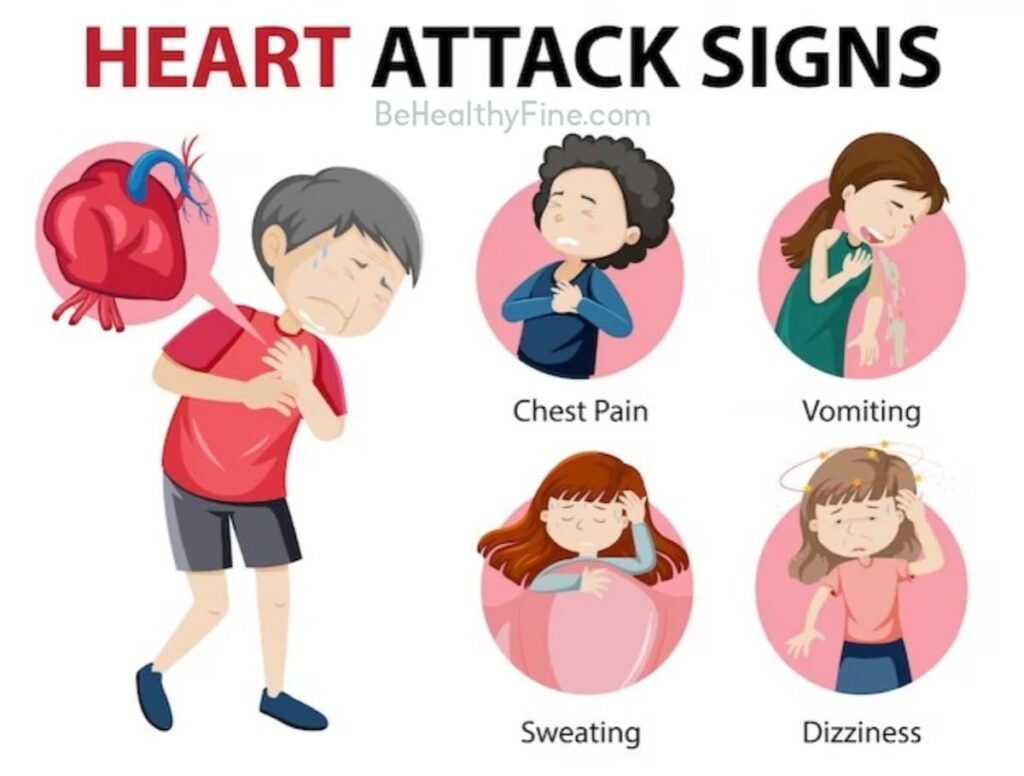Average Age of Heart Attack in Females
Heart attacks, a significant concern in the realm of women’s health, are often associated with men. However, understanding the Average Age of Heart Attacks in Females is super important for dealing with this really serious issue.
In this Article we will explore various factors such as risk factors, warning signs, preventive measures, and available support, it helps us better understand this important issue.
Understand Heart Attacks in Females
Heart attacks are still a major cause of death worldwide, and they affect women differently than men. In the past, women typically had heart attacks later in life than men.
But now, more and more younger women are having these serious heart problems. This change shows we need to pay more attention to women’s heart health and take steps to prevent heart attacks tailored specifically to them.
Understanding the Average Age of Heart Attack in Females
The age when women usually have heart attacks can be affected by different things. Lifestyle habits like smoking, eating unhealthy foods, not exercising enough, and being under a lot of stress play a big role.
Also, if there are heart problems in the family or if someone already has health issues like high blood pressure or diabetes, it can make heart attacks happen earlier in life. Knowing about these things is really important for coming up with good ways to help women with their heart health and making sure they get treated early if there’s a problem.
Fatest Weight loss Challege for Females Click👉 – [Check Out]
Risk Factors Leading to Early Onset Heart Attacks
As women get older, the chance of having a heart attack naturally goes up. But there are other things that can make heart attacks happen earlier in life for women. Changes in hormones, especially during menopause, can make the risk go up a lot.
Also, health problems like diabetes, high blood pressure, and being overweight can speed up heart problems in younger women. Understanding how all these things work together is really important for doctors to spot and manage heart risks in women, no matter their age.
By dealing with these issues early and making changes in lifestyle, we can help lower the chances of younger women having heart attacks and improve the overall heart health of all women.
The Role of Hormones in Heart Health
Hormonal changes, especially with estrogen, are really important for women’s heart health. Estrogen is known for helping protect the heart, but its levels drop after menopause. This drop can make women more likely to have heart attacks.
Understanding these changes in hormones is key to understanding why women might have heart attacks at different ages than men. By knowing how hormones affect the heart, doctors can come up with better ways to prevent and treat heart disease in women. This can lead to better results and a better quality of life for women.
Heart Attack Symptoms and Warning Signs in Females

Heart attack symptoms in women might not be as obvious as they are in men. While chest pain is a common sign, it might not be the main thing women feel during a heart attack.
Instead, they might have symptoms like feeling tired, having trouble breathing, feeling sick to their stomach, or pain in their back or jaw. The problem is, these symptoms are often thought to be something else, so women might not realize they’re having a heart attack. This can lead to a delay in getting diagnosed and treated.
It’s really important for both women and doctors to know about these different symptoms so that heart attacks can be caught early and treated quickly, which can help women have better outcomes.
Signs of Heart Attack a Month Before
These warning signs, often subtle, might indicate potential heart issues that require attention. Here are some potential signs that could appear a month before a heart attack:
- Unusual Fatigue: Feeling unusually tired or fatigued, especially if it’s not linked to any particular physical or mental exertion, could be a sign of an impending heart issue.
- Shortness of Breath: Experiencing difficulty breathing or shortness of breath, especially during routine activities that didn’t previously cause such discomfort, could indicate an underlying heart problem.
- Chest Discomfort or Pressure: Some people might experience mild discomfort, tightness, or pressure in the chest, which can come and go. It might not be severe but could be a sign of an underlying heart issue.
- Indigestion or Upper Body Discomfort: Unexplained indigestion, heartburn, or discomfort in the upper body such as the arms, back, neck, or jaw could signal potential heart problems.
- Sleep Disturbances: Insomnia, disturbed sleep, or waking up frequently during the night without any apparent reason might be a sign of an impending heart issue.
- Increased Anxiety or Uneasiness: Feeling unusually anxious, restless, or having a sense of impending doom without a specific cause could be a warning sign of heart trouble.
- Dizziness or Lightheadedness: Frequent dizziness or lightheadedness, especially when accompanied by other symptoms, could indicate a heart-related concern.
- Heart Palpitations: Irregular heartbeats or a sense of skipped heartbeats might be a sign that something is amiss with the heart.
It’s crucial to remember that these signs can vary greatly among individuals, and not everyone will experience the same symptoms. Also, these symptoms might not necessarily mean a heart attack is imminent, but they could be warning signs of potential heart issues that require medical evaluation.
If anyone experiences these symptoms, especially if they persist or worsen, seeking medical attention promptly is advisable to rule out any serious conditions and ensure proper care and treatment.
Read More: Normal Testosterone Levels in Women
Read More: Constipation in Women Causes Symptoms And Solution
Preventive Measures and Lifestyle Changes
Preventing heart attacks in women is really important. Going for regular check-ups can help catch any potential problems early. Eating a healthy diet with lots of fruits, veggies, whole grains, and lean proteins can keep cholesterol levels in check and help maintain a healthy weight.
Getting regular exercise strengthens the heart and keeps the whole cardiovascular system healthy. Finding ways to manage stress, like practicing mindfulness or doing things you enjoy, can also lower the risk of heart disease.
And of course, avoiding smoking and not drinking too much alcohol are really important for heart health too. By making these changes part of your daily routine, women can lower their chances of having a heart attack and live healthier lives.
Treatment Options and Interventions
Getting medical help quickly during a heart attack is really important to limit the damage. Doctors might give medicines to break up blood clots, reduce pain, and calm inflammation. They might also do procedures like angioplasty to open up blocked blood vessels in the heart.
Afterward, joining rehab programs can help strengthen the heart and improve overall health. These treatments don’t just deal with the current heart problem; they also help prevent future heart issues.
Psychological Impact and Support
Having a heart attack can really affect a woman’s emotions and well-being. Getting emotional support and counseling is really important for helping women deal with feelings like fear, anxiety, and depression that might come up after a heart attack.
Being part of support groups or connecting with community resources can be really helpful too. It lets women talk to others who have been through similar experiences, so they can share feelings and encourage each other.
By reaching out to these support networks, women can work through the emotional effects of a heart attack and focus on getting back to feeling healthy and happy.
Empowering Women for Heart Health
It’s really important to make sure women know about heart health. By teaching, speaking up for, and running campaigns specifically about women’s heart health, we can help women learn more and feel empowered to take care of their hearts. This means they’ll know when it’s important to get medical help quickly.
Conclusion
Knowing The Average Age of Heart Attack in Females is really important for dealing with the changing world of heart health.
By understanding all the different things that can affect women’s chances of having a heart attack, like hormones, lifestyle choices, and existing health problems, we can take steps to prevent them and offer the right support.
With specific plans to help and more people knowing about the risks, we can aim to lower the number of heart attacks in women of all ages and help them have better heart health overall.
Thank you for Read this Informative Article, hope it is helpful for you. Don’t forget to checkout this Fast weight loss challenge for women’s






